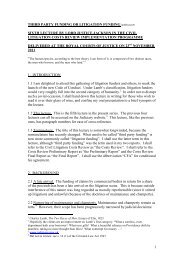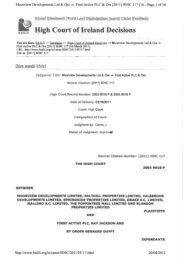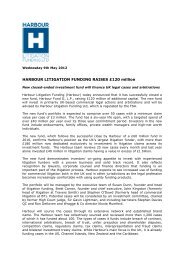Download PDF document - Harbour Litigation Funding
Download PDF document - Harbour Litigation Funding
Download PDF document - Harbour Litigation Funding
Create successful ePaper yourself
Turn your PDF publications into a flip-book with our unique Google optimized e-Paper software.
Kelly, Grossman & Flanagan, LLP v Quick Cash, Inc. :: March, 2012 :: New York Ot...<br />
http://law.justia.com/cases/new-york/other-courts/2012/2012-ny-slip-op-50560-u.html<br />
Page 2 of 6<br />
15/10/2012<br />
In this action, Plaintiffs seek a judgment declaring that certain agreements between the<br />
parties [*2]are void as criminally usurious in violation of Penal Law §190.04. The record<br />
reveals that Plaintiffs, as partners in a law firm, executed certain <strong>document</strong>s which<br />
provided that Plaintiffs would repay to Defendants a principal amount plus a fee which<br />
Plaintiffs allege amounted to an annualized interest rate in excess of 40%.<br />
The complaint alleges that in May 2005, non-party Personal Injury <strong>Funding</strong> IV, LP, an<br />
affiliate and/or predecessor of one of the Defendants, extended a loan in the amount of<br />
$46,250 to plaintiff Muraca & Kelly, LLP. It alleges that, in October 2006, defendant<br />
Money For Lawsuits LP V extended a loan in the amount of $287,500 to plaintiff Muraca<br />
& Kelly, LLP; and the complaint alleges further that in December 2006, defendant<br />
Money For Lawsuits LP V extended a loan in the amount of $227,500 to plaintiff Muraca<br />
& Kelly, LLP. In April 2007, defendant Money For Lawsuits LP V extended a loan in the<br />
amount of $79,500 to plaintiff Muraca & Kelly, LLP. In September 2007, according to<br />
Plaintiffs, defendant Money For Lawsuits LP V extended a loan in the amount of $23,000<br />
to plaintiff Muraca & Kelly, LLP. Plaintiffs allege that each and every one of the loans<br />
provided for the repayment of the principal loan plus a fee at an interest rate in excess<br />
of 40%. Plaintiffs also allege that they have repaid defendants in excess of one million<br />
dollars.<br />
Plaintiffs contend that each and every payment they received from the Defendants was<br />
a loan and, therefore, subject to Criminal Usury laws under NY Penal Law §190.04. In<br />
support of this contention, Plaintiffs rely on the language of the original client<br />
agreements, which set forth that the Plaintiffs are "the Borrower" and the various<br />
defendants "the Lender". There was never any doubt, according to Plaintiffs, that<br />
Defendants were "lending" money. It was only in August 2009, state Plaintiffs, when all<br />
the agreements were consolidated, that Defendants converted the word "loan" to the<br />
word "advance" in order to mask the obvious fact that Defendants were covering for the<br />
lending of funds at a criminally usurious rate.<br />
Connect with Justia<br />
RT @TechCrunch: San Francisco Proposes Revised<br />
Open Data Legislation, Plans to Hire Chief Data<br />
Officer http://t.co/IBtYahbx by @anthonyha<br />
Justia on Facebook<br />
Like<br />
119,170 people like Justia.<br />
David Mikel Domenick Michael Charles<br />
Facebook social plugin<br />
Find a Lawyer<br />
Legal Issue or Lawyer Name<br />
City, State<br />
Search<br />
Browse Lawyers<br />
Lawyers - Get Listed Now!<br />
Get a free full directory profile listing<br />
Support Free Law<br />
Plaintiffs further assert that these loans were never non-recourse loans, despite their<br />
"label", because the Defendants were not at risk. For example, if a judgment debtor<br />
were unable to pay a judgment entered in favor of one of Plaintiffs's clients in an<br />
underlying case, the individual Plaintiffs were still personally liable to Defendants. In<br />
addition, Defendants received their repayment without any reduction for Plaintiffs' costs<br />
or expenses. Moreover, if Plaintiffs were discharged as counsel and unable to find<br />
replacement counsel, Plaintiffs were required to find a new case to replace the collateral<br />
(i.e. former case ) or pay liquidated damages.<br />
The complaint further alleges that from December 2007 through February 2008<br />
Defendants extended loans to plaintiff Flanagan & Associates. In August 2009, Plaintiffs<br />
and Defendants executed an Addendum to all prior agreements which provided that<br />
plaintiff Kelly, Grossman & Flanagan, LLP would assume responsibility for all<br />
outstanding loans and would provide additional collateral to secure the outstanding<br />
loans. Plaintiffs allege that the Addendum required them to pay an interest rate in<br />
excess of 40% annually. The instant action seeking declaratory relief voiding the<br />
alleged loans was commenced. [*3]<br />
Defendants moved to dismiss the complaint pursuant to CPLR 3211(a)(7). By order<br />
dated November 23, 2011 (Pines, J.), this Court converted the motion into a summary<br />
judgment motion and directed the parties to file and serve supplemental affidavits and<br />
other available proof, if desired, on thirty days' notice.<br />
Kenneth Bradt avers in his personal affidavit that he is the President and CEO of<br />
defendants Quick Cash, Inc, Case <strong>Funding</strong>, Inc., and is a general partner in defendants<br />
Guardian Advisors LP I, Guardian Advisors LP II, and Money For Lawsuits LP V (Quick<br />
Cash Entities). He states that the principal purpose of the Quick Cash Entities is to<br />
advance money to attorneys and/or plaintiffs involved in litigation in either recourse<br />
loans or non-recourse advances. Bradt states that in a recourse loan, the attorneys<br />
grant a lien to the Quick Cash Entity against the attorneys' fees expected to be received<br />
on cases handled by the attorney/firm, and the attorney makes either monthly<br />
payments to the Quick Cash Entity or pays when each case settles and/or at the end of<br />
the term of the loan. Bradt avers however, that if the agreement is a non-recourse<br />
advance, the attorney assigns to the Quick Cash Entity a portion of their expected fee<br />
from the case or cases in which the attorney represented one or more of the parties,



![Neutral Citation Number: [2010] EWHC 941 (QB) - Harbour ...](https://img.yumpu.com/47188668/1/190x245/neutral-citation-number-2010-ewhc-941-qb-harbour-.jpg?quality=85)
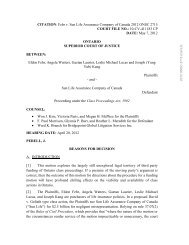
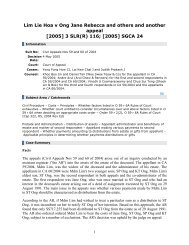
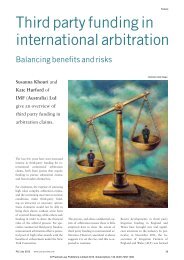
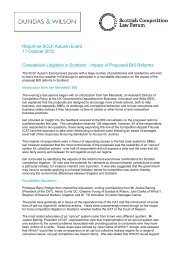
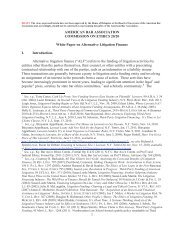
![Hall v Poolman [2009] - Harbour Litigation Funding](https://img.yumpu.com/37488843/1/190x245/hall-v-poolman-2009-harbour-litigation-funding.jpg?quality=85)
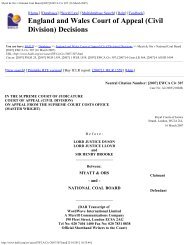

![[2013] SGHC 135 - Singapore Law Watch](https://img.yumpu.com/37488807/1/184x260/2013-sghc-135-singapore-law-watch.jpg?quality=85)
